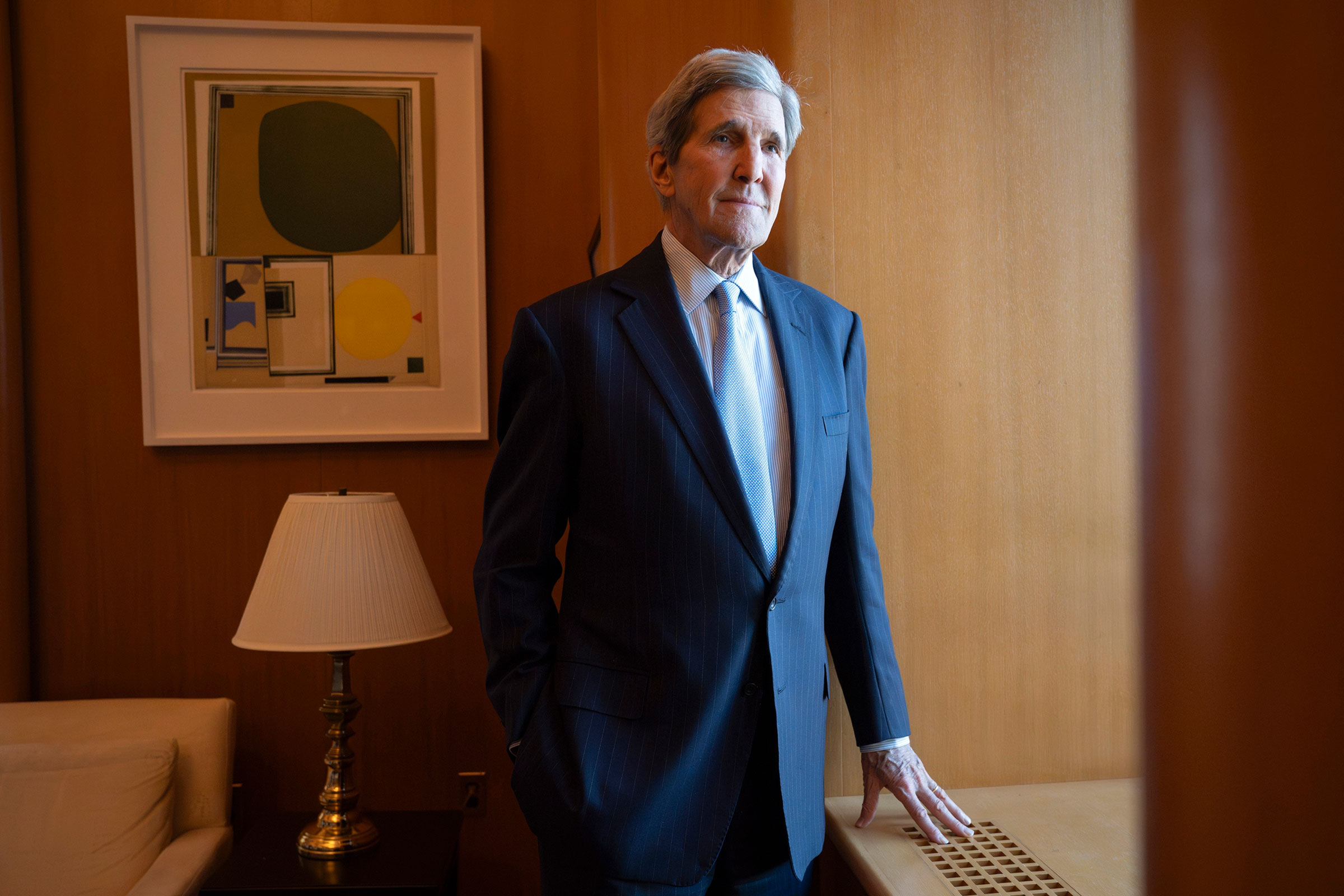For a brief moment, John Kerry, 80, admits that he is tired. We’re sitting in the back of his chauffeured van, and the former U.S. Secretary of State turned presidential climate envoy arrived here at his hotel in Paris 15 minutes ago after an overnight flight from Abu Dhabi. His week ahead includes stops in Oslo and Munich before more meetings in Paris, but as we roll to the Élysée Palace, home to French President Emanuel Macron, he puts on a game face, exchanging with aides on everything from France’s diplomatic relationships to recent farmer protests that rocked the country. In the palace, he skips the espresso on offer from a smartly uniformed porter (Kerry doesn't drink coffee), and heads straight into a meeting with Macron, emerging some 40 minutes later smiling and laughing.
It’s a fitting start to Kerry’s last multi-stop trip abroad as climate envoy. For the past three years, he has tirelessly crisscrossed the globe, showing up at the doorsteps of world leaders, pursuing his belief that face-to-face diplomacy can deliver big outcomes. One target in Paris is the defining issue for international climate talks in 2024: finding the money to finance climate projects not just in wealthy countries but in developing ones, too. “The single most impactful missing ingredient to winning this battle is money,” Kerry told me on Feb. 16. “If you can open some doors, you may be able to make some progress.” What’s most interesting about the stop is that it says as much about where Kerry is going next, as what he’s trying to wrap up before he steps down after nearly 40 years in government service.
Kerry has racked up a long list of accomplishments in his three years as climate envoy: a climate detente with China, boosting early stage clean technologies, and a big push to cut methane emissions, to name a few. Less noticed has been his attention to the private sector. Transitioning the world’s energy systems from fossil fuels to clean energy will require an annual global investment measured in the trillions. Kerry is convinced that private money is the only way to make it happen. Through partnerships and U.S. government programs, initiatives, and convenings, Kerry has pushed the international climate world to put business and private finance at its core. “No government has enough money or will find enough money to do what we have to do,” he tells me. “We have to bring the private sector to the table.”
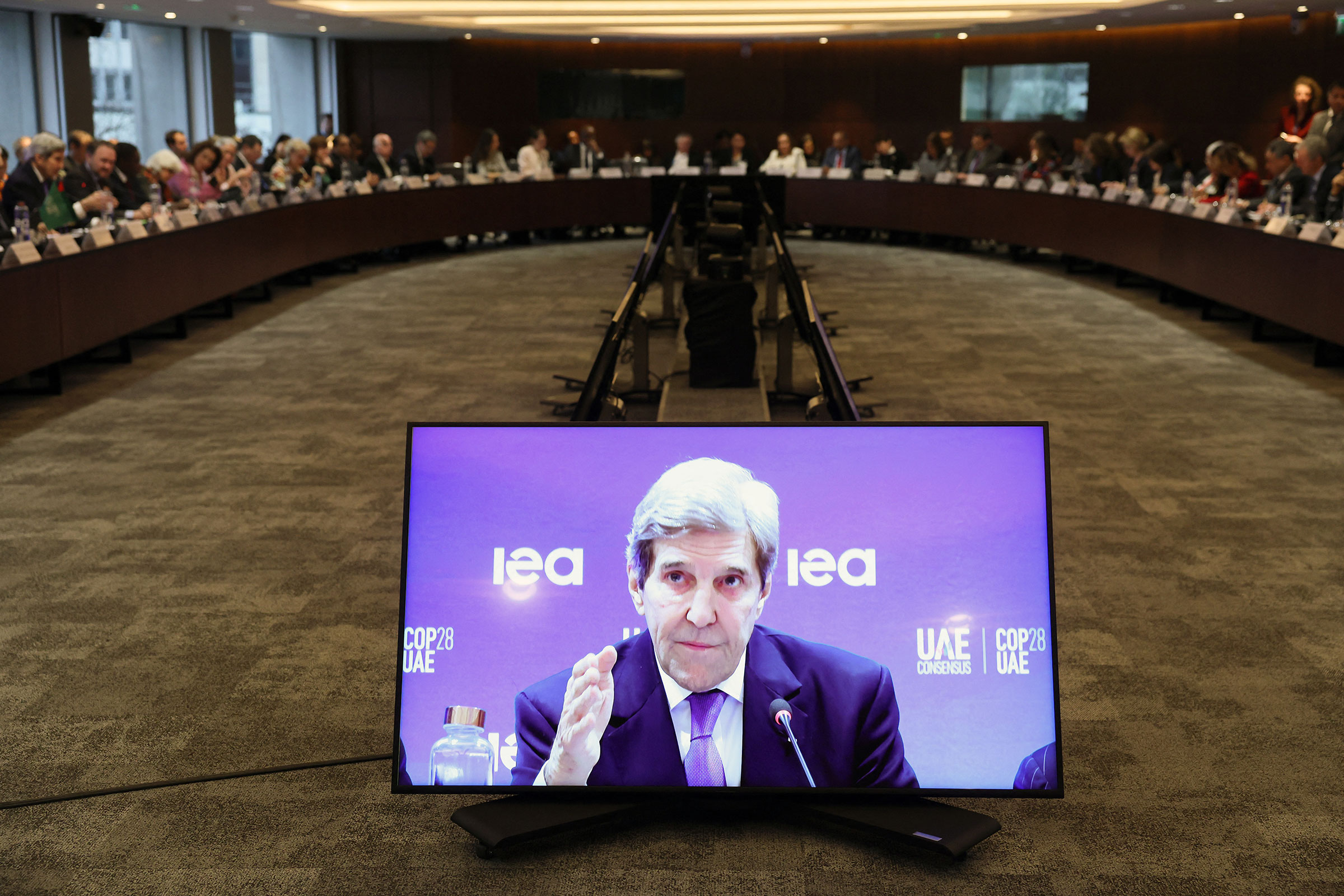
There are obvious limits to Kerry’s approach. The face-to-face relationships at the heart of his work are only as good as the next election, which can place a new party in power everywhere from the U.S. to allied and rival countries around the world. And while companies can typically stay above the fray of daily politics, they remain accountable to the well-being of shareholders, not the general public, making them potentially conflicted partners for the larger goals of the transition. With emissions poised to grow rapidly absent adequate finance for clean energy, there's little margin for error.
That explains Kerry’s plans for life after government work. He insists time and again that he is not retiring and says that the next phase of his career will be in the private sector so he can fully realize the work he started as climate envoy. The details—who he’ll work with, what exactly his day job will be—remain murky. But, he tells me, he envisions playing a key role connecting private capital with the countries, regions, and projects that need it most. It’s a pragmatic approach for someone who is often criticized as an idealist. But it still requires optimism—and for Kerry that’s characteristically in no short supply.
Once a year, Munich’s Hotel Bayerischer Hof is transformed from a bastion of old world European luxury to the center of global affairs. Wander the hotel’s halls during the Munich Security Conference and you’re likely to bump into princes and presidents, senators and spy chiefs—and at this February’s meeting Kerry seemed to know them all. In a few hours trailing him, I watched as he stopped to chat with a Saudi prince who formerly ran the country’s intelligence service, participated in an impromptu photo opp with a Ukrainian Deputy Prime Minister, and popped his head into an Australian billionaire’s drinks reception.
In 2013, historian Douglas Brinkley termed Kerry’s belief that face-to-face, high-level diplomacy can tackle some of the world's most intractable problems the “Kerry Doctrine.” And that approach has been front and center in his work as climate envoy. He re-entered office in the middle of the COVID-19 pandemic with U.S. credibility on climate zapped by Donald Trump’s regressive approach to the issue and immediately began flying around the world to meet with allies and rivals. He was the first senior Biden official to visit China amid icy bilateral relations and stringent COVID restrictions. Shortly thereafter, he sat masked with President Biden to host a virtual world leaders climate summit. On the Zoom screen were friends, think of German Chancellor Angela Merkel, as well as leaders from countries with more complicated relationships like Brazilian President Jair Bolsonaro. While some are skeptical, even dismissive, of the non-stop stream of summits and meetings that define the calendar of many climate officials, Kerry loves them. “You can get a lot of things done in a 30-second interaction,” he told me in Munich between pull-asides with other officials.
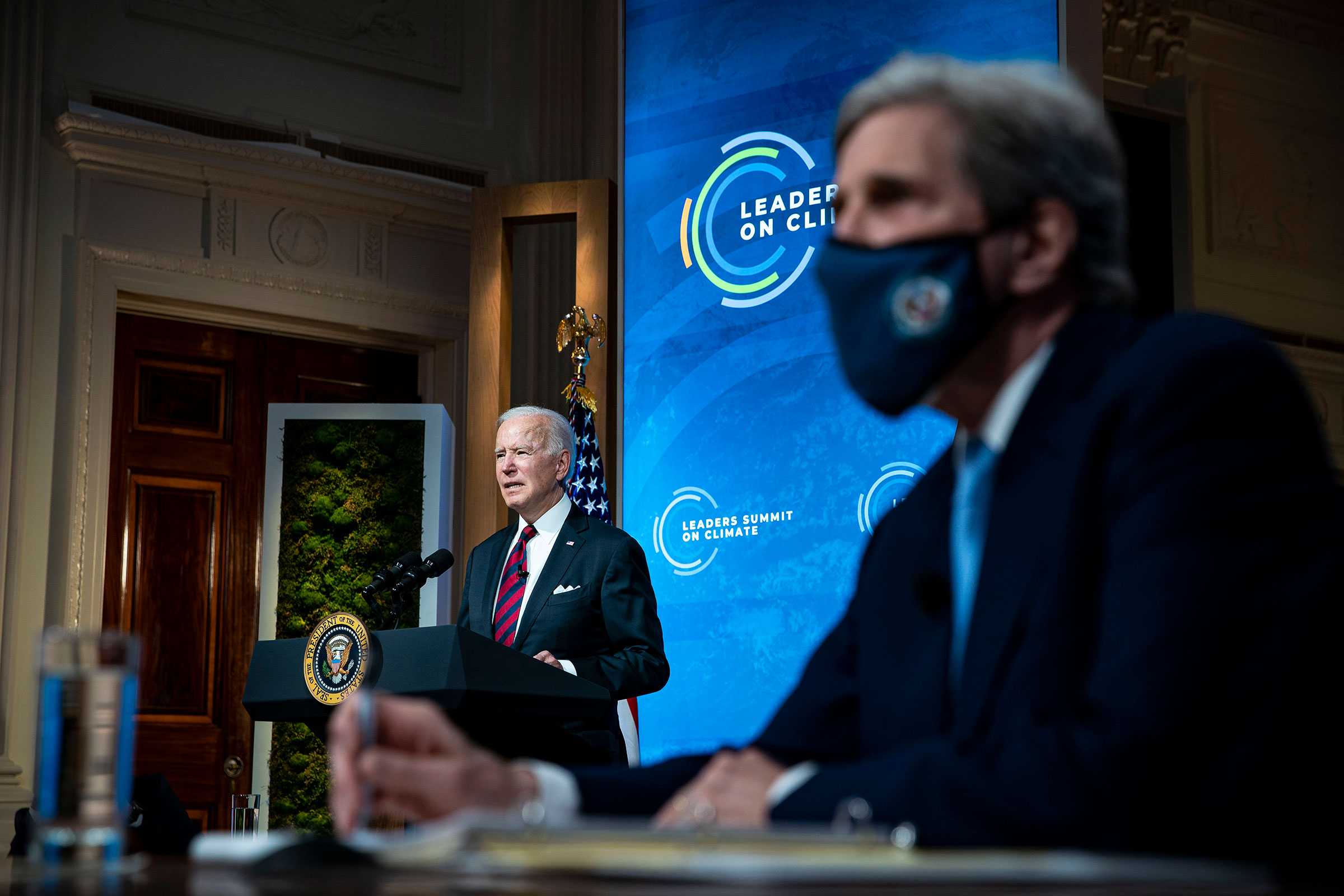
The most obvious place to see how Kerry has used these relationships is in official multilateral negotiations. The U.S. has always played a big role in international climate talks, using its influence and resources to advance its own strategic interests. But, in addition to the confabs, Kerry received a warm welcome in presidential palaces, foreign ministries, and finance departments where his longstanding relationships from four years as Secretary of State and longer on the Senate Foreign Relations Committee opened doors. “Every corner around the world, wherever I would go, they would say we want to meet with John Kerry,” says Amos Hochstein, a key Biden energy advisor and envoy.
The approach made a difference at key moments. In the final hours of the UN climate conference in Glasgow in 2021, for example, talks remained at risk of falling apart with China and India protesting language calling for an end to coal-fired power. Kerry, who I spotted walking the conference grounds late into the night with his Chinese counterpart Xie Zhenhua, drew on past negotiations to suggest a middle ground that China eventually supported. “It was highly influential and persuasive,” says Sue Biniaz, Kerry’s deputy. Last November, the years of negotiation between Xie and Kerry paid off at the Sunnylands estate in Rancho Mirage, CA. The two men laid out a framework for cooperation and sustained climate dialogue between China and the U.S. that was subsequently endorsed at a wide-ranging summit between Biden and Chinese President Xi Jinping elsewhere in California on Nov. 15. “Sunnylands was a breakthrough,” Kerry says.
And then there was last year's COP28 climate summit in Dubai, led by Sultan Al-Jaber. Throughout 2023, Al Jaber faced criticism for holding onto his job as the CEO of the Abu Dhabi National Oil Company while also running a climate conference. Kerry remained publicly optimistic that Al Jaber would deliver progress even as others bolted from public association with a controversial figure. In the end, the UAE produced a global climate deal that for the first time included a reference to winding down fossil fuels. In Munich, a few months later, the two hugged as old friends would.
But friendly relations alone can’t overcome the biggest obstacle in climate talks: the need for money. The demand for cash has played a key role in climate negotiations for decades. In 2009, negotiators reached a key breakthrough when developed economies committed to catalyzing $100 billion in annual climate finance for their developing counterparts by 2020.
That money has been slow to come. Kerry entered office convinced that climate progress depended on cash. To start, Kerry drove the White House to commit to do more. A key moment came in 2021 as Kerry pushed Biden to announce a big international climate finance commitment in his UN General Assembly speech. Not everyone in the administration agreed: spending billions to help other countries address climate change isn’t exactly a political winner. But Kerry persisted, knowing that U.S. credibility relied on making a financial commitment. “He was relentless,” says Samantha Power, the USAID administrator. I recall being with him on the sidelines of UN meetings hours before Biden's speech when he was unsure whether his arguments would win the day. Ultimately, Biden committed the U.S. to spending $11 billion annually by 2024.
The commitment was enough to show the U.S. had not abandoned the global challenge of helping meet the world’s climate finance needs—but it was far from sufficient. More public money was out of the question, so Kerry turned to the private sector—not asking for their charity but trying to convince them that investing in clean energy globally could deliver returns.
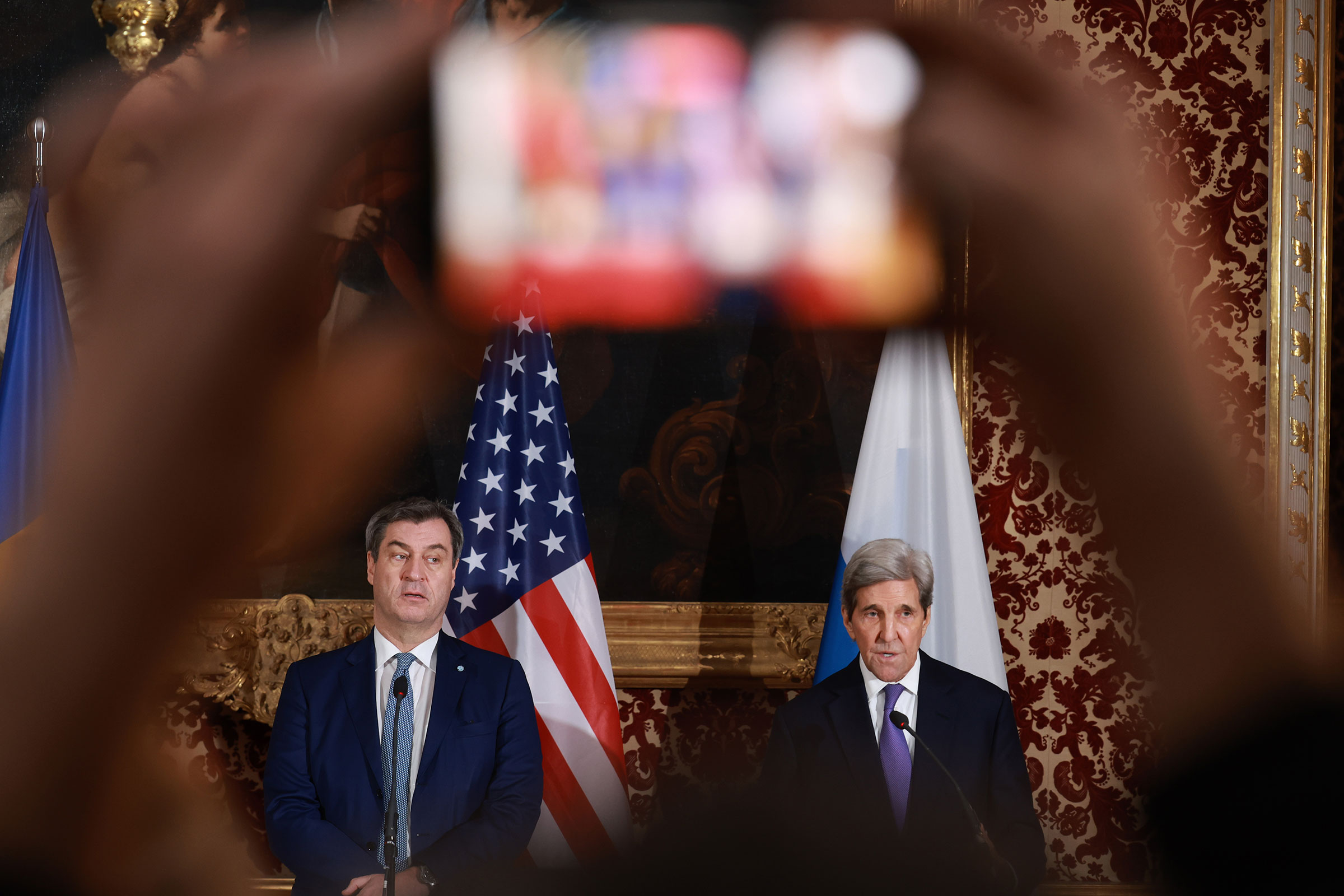
In his travels across the world, Kerry consistently paired private sector engagement with his government meetings. In Glasgow, Kerry slipped away from the diplomatic negotiation halls to launch the First Movers Coalition, a partnership between some of the world’s largest companies to catalyze investment in technologies by securing advance purchasing commitments. At COP27, in Sharm El-Sheik, Egypt, Kerry launched a so-called Energy Transition Accelerator, a partnership to advance private clean technology investment in emerging economies by creating a system for exchanging carbon credits. The program was widely panned as being inadequately designed, but few denied the need for a creative approach to the problem. And, in Dubai, he hopped between meetings with government officials and private sector leaders, making the case that climate efforts needed private capital. He even managed to incorporate the private sector in ways that would have been considered unthinkable just a few years ago. He turned a new U.S. program focused on helping emerging economies adapt to climate change, known as PREPARE, into a public-private partnership.
In assessing any public official’s legacy it can be easy to look for one or two initiatives to dub crowning achievements or grand bargains. Kerry has a few of those. But rethinking the way climate finance works may be even bigger. “Three plus years into the administration, it now seems maybe entirely obvious that the private sector would be absolutely central to the way that people think about climate finance,” says Power. “But I don’t know that it was obvious.”
It is remarkable that a Democrat, who as a U.S. Senator was one of the country’s most liberal lawmakers, would turn out to be a leading voice of the private sector. And in a different version of history, Kerry might never have turned to the private sector at all. The U.S. could have enacted significant climate legislation in the early 2000s, and Kerry would have spent his years as Secretary of State touting his own country’s domestic climate accomplishments.
Instead, Kerry witnessed repeated efforts to pass a climate law fail. He was a junior senator when efforts to pass an energy tax fell apart under President Bill Clinton. And he led an ill-fated Senate effort to pass a cap-and-trade law early in Obama’s presidency. When he left public office for the first time in decades in 2017, Kerry watched from afar as the Trump Administration sought to dismantle the climate rules the U.S. had implemented.
Amidst the roll backs, though, Kerry saw a bright spot emerge from American companies that insisted they would continue to work on climate change. Kerry set up a climate focused institute at Yale and invited top executives to discuss the urgency of emissions reduction. Power, who also worked with Kerry when she was UN ambassador, recalls seeing his interest in the private sector grow during his time out of office. “He built in those years just a set of connections and a mindset that had him thinking about private sector enlistment as a design feature of every initiative he put forward,” she says.
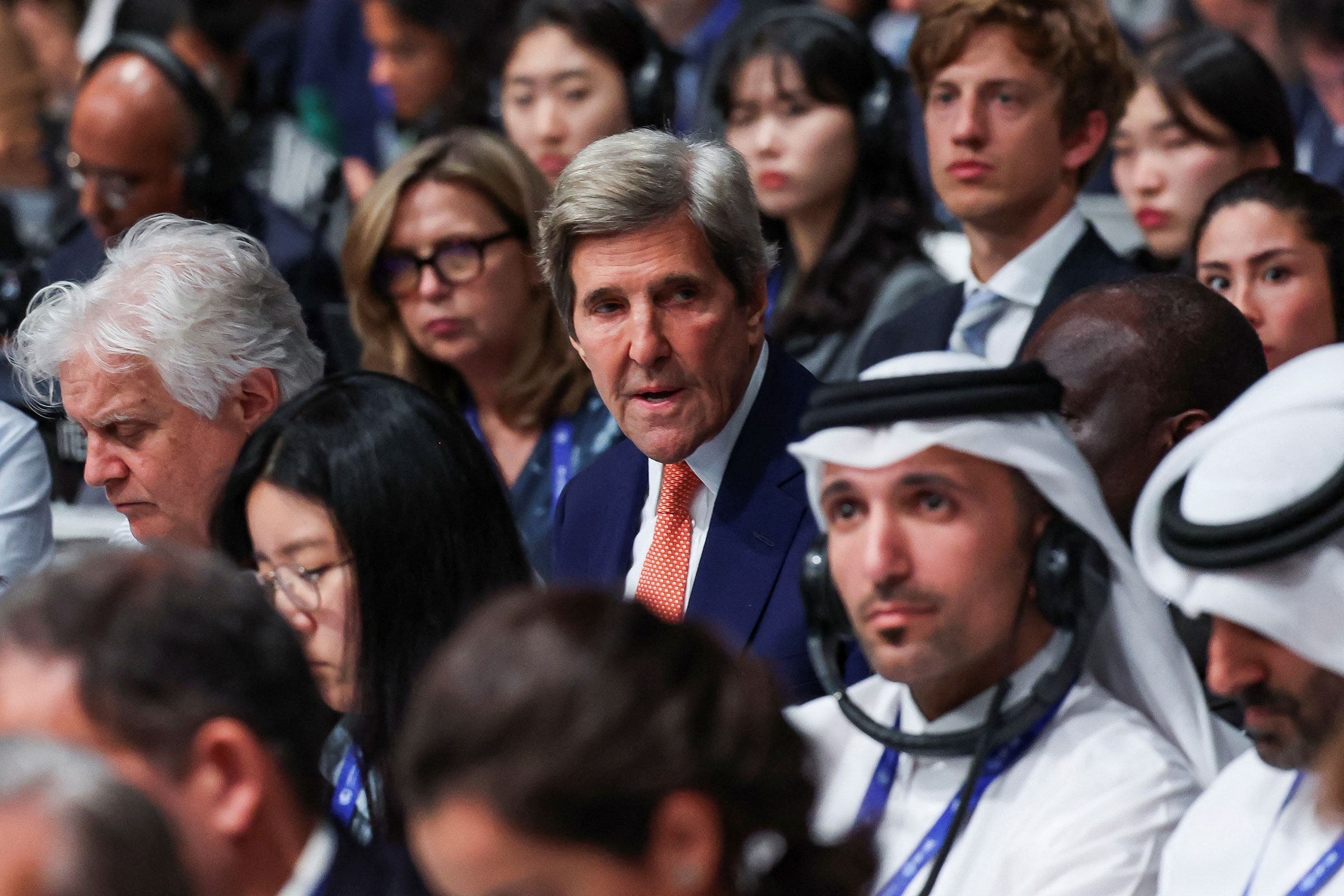
Over the last several years, I have asked Kerry whether there was a moment where he decided to focus on the private sector. He says his efforts today are a “continuum.” Kerry insists to me that “government works better than some people think,” but implicit in his answer is the reality the U.S. government has failed to meet the scale of the challenge of climate change, at least in part due to politics. He tells me that he doesn’t read closely the right-wing headlines that are constantly hammering him, often accusing him of flying in a private jet (he flies commercial). “It's so stupid,” he says. “It really shows how bankrupt they are.”
Since taking office, he has been reticent to speak publicly about that so-called “bankruptcy” and his bigger fears about the state of the world. He admits to me that he had to “restrain” himself from getting out of his lane. But in Munich, where I watched his staff notify him of the death of Alexei Navalny, he seemed to be itching to say more. Political antics in the U.S. have made it harder for the U.S. to get things done on the world stage. “We have to find serious people who want to make some real decisions—because we can't govern like this,” he says. “People are wondering: Can we count on you?”
All of this adds up to an alarming picture. He likens this moment to the “tricky time of the 1930s” and adds “collision is not impossible.” “An accident could happen, a misinterpretation could happen, or impatience could overtake reason,” he says. And then he snaps back to the trademark optimism that admirers say defines John Kerry, and detractors say reveals his naivete: “The antidote to all things is always diplomacy.”
With all of this in mind, it might seem odd for Kerry to leave government for private business focused on turning a profit. And yet, if he does indeed go that route, in a way it makes sense. In speeches and interviews, Kerry likes to remind the audience of the stakes of failing to act on climate—extreme weather that turns into political and economic chaos. In his telling, the key factor to halting those scenarios is money, trillions upon trillions, and where better to do that than in the private sector. He hasn’t sorted out all the details of his next gig—or at least he wouldn’t share them with me—but he envisions himself continuing to fly around the world, connecting money with the places that need it. “The private sector just moves differently,” says Kerry. “You can cut to the quick and get at it.” And he does it without even a cup of coffee.
TIME receives support for climate coverage from the Outrider Foundation. TIME is solely responsible for all content.
Correction March 12
The original version of this story misstated the focus of the meeting between Pres. Joe Biden and Pres. Xi Jinping of China on Nov. 15 in Woodside, Calif. Climate was discussed at the meeting, but was not its focus.
More Must-Reads From TIME
- The 100 Most Influential People of 2024
- Coco Gauff Is Playing for Herself Now
- Scenes From Pro-Palestinian Encampments Across U.S. Universities
- 6 Compliments That Land Every Time
- If You're Dating Right Now , You're Brave: Column
- The AI That Could Heal a Divided Internet
- Fallout Is a Brilliant Model for the Future of Video Game Adaptations
- Want Weekly Recs on What to Watch, Read, and More? Sign Up for Worth Your Time
Write to Justin Worland/Paris at justin.worland@time.com
